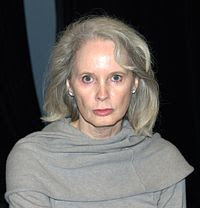During the 2008 election, I was reading Curtis Sittenfeld’s novel American Wife, which revolves around a fictionalized version of Laura Bush. It was an odd thing to be reading at the height of Obama mania. At the end, there’s a “twist”: she didn’t vote for him. On some level because she didn’t want to be First Lady, but also because in her sensible librarian way she thinks the other guy is more qualified. When she thinks about all the decisions the Bush-like character has made, she tells the reader, hey, I just married him, you all elected him. It’s a funny moment. It’s also one that from a certain point of view could be seen as a kind of liberal fantasy, with all the flaws therein, an extension of the old knock against Pauline Kael not knowing anyone who voted for Nixon: the liberal feminist novelist can’t imagine anyone who would vote for Bush, not even his wife. But Sittenfeld can’t really explain why she married him either, except suggesting his sexual prowess from some scenes I’m still trying to get out of my head and which prevent me from recommending the novel to anyone in good conscience.
What I’ve Been Up To
― Kurt Vonnegut
Feeling Sentimental
Apparently we pregnant types are supposed to be sentimental. Every other blogpost on the pregnancy part of Babble is about crying at the cotton commercial or something. For better or worse, I seem to be the same cynic I’ve always been.
Vanity and Despair
Poetry Corner: Transformations
Early in my pregnancy, when the changes were subtle and undetectable, I compared the experience to music playing in the background: something you would tune into or out of many times over the course of a day, without fully realizing it. At the same time, actual music was taking on more weight: instead of having the ipod on and being half tuned in while I read, it took all my attention to keep up. Along with music, poetry seemed more interesting than anything else I was reading: against all the books and columns and blogs of deadly literal advise and polemics, nothing seemed more appropriate than the metaphoric. Not surprisingly, Plath’s “Metaphors” has held on as a the ur-text through all eight syllables (and counting) so far.
Talking to Strangers
When I was a kid, I was afraid of talking to strangers, especially under certain circumstances. I was scared of picking up the phone to call someone, or of knocking on someone’s door to sell Girl Scout cookies or what have you. Even recently, working on political campaigns that involve phone banking or door knocking fills me with dread. When I was in college I tried to write for our school paper. I remember interviewing a professor of mine – not a stranger, but close enough – about a new policy on student-faculty dating. I remember sitting there trembling while he said something about how student-teacher relationships were inevitably erotic, but you couldn’t get such a subtle point across in an article, so please don’t include that. (Yes, he was an English prof.) I didn’t include it and the story went on the front page and soon after I switched to writing reviews.
Later she notes how much more willing to run from the situation she is than she was at sixteen, when she corresponded with a prisoner. But it would be too glib to say, ah yes, well, there’s talking to strangers and then there’s going to the houses of strangers when you’re a woman and when it’s the latter you know where the fear comes from, and that it may be a gift, like the self-help books say. What is being an artist or a creative person if not the fantasy that we will be something other than another person who doesn’t understand, and that the understanding may spare us? Ron may not deserve it, but we do.
More Gaitskill
 When I was about eleven, I wrote a story for English class about a teenager who wanted to be a model. I found it a few years later and my budding feminist self was mortified: it seemed the sort of thing written by an eleven year old reading certain magazines, the worst possible topic for a young girl who understandably wants to write about the only thing young girls can write about, which is wanting.
When I was about eleven, I wrote a story for English class about a teenager who wanted to be a model. I found it a few years later and my budding feminist self was mortified: it seemed the sort of thing written by an eleven year old reading certain magazines, the worst possible topic for a young girl who understandably wants to write about the only thing young girls can write about, which is wanting.
Me, Elsewhere
I have a review of Vivian Gornick’s short biography of Emma Goldman up at the November issue of Open Letters Monthly.
Poetry Corner: Dedication
Reading for the Plot
I remember, back when I was still a student (I say this as if it was some little brief fling instead of how I spent more than half of my life), reading a preface to one of Doris Lessing’s novels. I think it was Martha Quest, although it might have been the namesake of this humble blog. In any case, the preface quoted Lessing crediting her literary accomplishments to her lack of formal schooling. It gave her the freedom, she said, to read the way one should read: haphazardly, without a plan, wherever one’s interests and fancy took one. Well. I set her aside for awhile and guiltily went back to whatever I was supposed to be reading for a seminar. Now that I’m out of school (as much as a teacher can be), working on fiction as much as anything academic, I read more this way than I probably ever have. I don’t know if I agree completely with Lessing: there’s something to trying to discipline oneself to read deeply into a certain topic, even through the boring parts. In any case, I had something of an odd summer, and at the end of August I realized that what I’d read over the last two months – the good bad and ugly, made no sense together whatsoever, except that it made perfect sense. One feels, nonetheless, some need to account for What is Found There (the remnants of the good student, perhaps).
